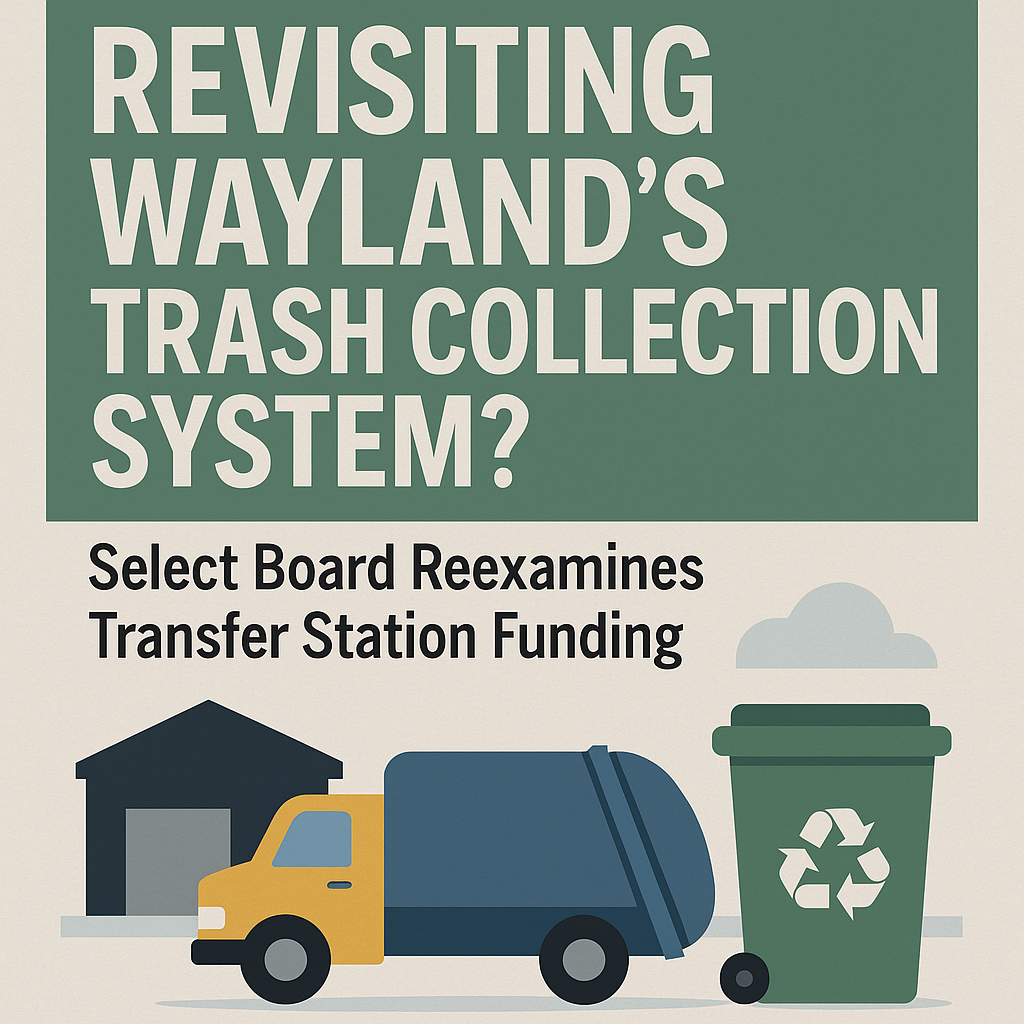By The Wayland Post Staff
Wayland residents will continue to bring their household waste and recyclables to the transfer station, as no town board or committee has recently proposed curbside trash or recycling pickup. At the same time, at least one resident is urging the town to revisit the issue and study whether a town-wide hauling program could lower emissions and long-term costs.
At its Nov. 3 meeting, the Select Board reviewed the transfer station’s finances in connection with the town’s structural deficit. Chair Carol Martin said the board should re-evaluate the annual subsidy to the transfer station, which operates as an enterprise fund, as part of broader fiscal planning. The discussion reaffirmed that Wayland’s long-standing system—requiring residents to purchase annual stickers and transport their own waste—remains intact and financially stable.
The Board of Public Works reported on Oct. 21 that sticker sales and overall revenue have remained steady despite a $75,000 reduction in general-fund support. Public Works is proceeding with a Request for Qualifications to evaluate the transfer station’s operations and long-term capital needs. A five-member committee will review submissions and recommend improvements, but the effort is limited to efficiency and sustainability—not to expanding town services into curbside pickup.
The Capital Improvement Planning Committee also listed the transfer station in its enterprise-fund review on Sept. 30, noting its role in capital budgeting. None of the boards have discussed establishing or funding municipal curbside collection.
While town leaders focus on fiscal management, resident Klaus Shigley has advanced an alternative vision. In a March 2023 memo to the Conservation Commission, Climate and Energy Committee, and Department of Public Works Director Tom Holder, Shigley proposed a feasibility study on replacing the sticker system with town-wide trash hauling and recycling.
Citing data from the DPW, he noted that only about 1,500 of Wayland’s 4,779 households still buy landfill stickers, down from more than 2,000 in 2017, suggesting that roughly 3,300 households already contract privately for pickup. He calculated that 1,500 weekly car trips to the transfer station produce an estimated 260 metric tons of CO₂ per year, compared with about 14.5 tons if the same homes were served by collection trucks—an annual reduction of roughly 245 metric tons.
Shigley’s proposal emphasized potential environmental and cost benefits. Based on figures from Waste Management’s Public Sector Solutions division, he estimated that a single-vendor town contract could cost between $1.5 million and $2.5 million per year—comparable to what residents already spend privately—while reducing redundant hauler mileage and emissions. He also suggested including compost and leaf collection to address local conservation concerns.
The feasibility study he outlined—estimated at $25,000 to $30,000 by the UMass Boston Collins Center—would explore service configurations, pricing, and potential transitions to a single vendor. The study would also examine whether the transfer station could be repurposed or partially retained for bulky-item disposal.
Town officials have not acted on that proposal, and recent meetings show no movement toward town-wide service. For now, the transfer station remains the centerpiece of Wayland’s waste management system—supported by user fees, modest subsidies, and continued discussion about how best to balance convenience, cost, and sustainability.













